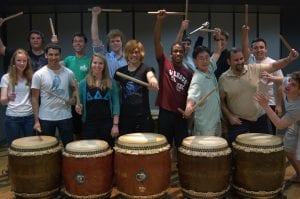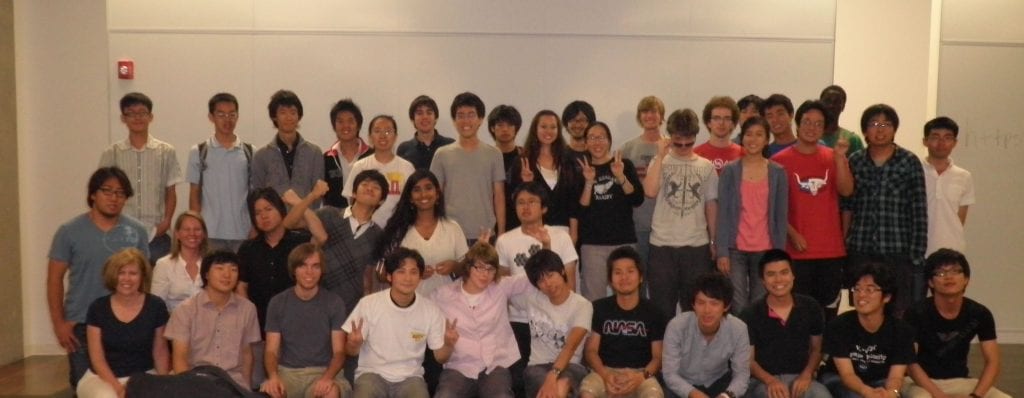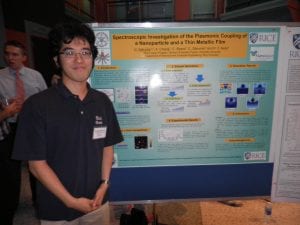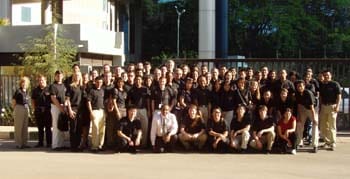Within the Kono Group, we manage a number of innovative international research and education programs for students at all levels. To learn more about our innovative international research and education programs see the overviews and links below.
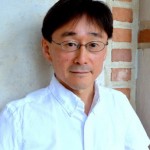 Prof. Junichiro Kono
Prof. Junichiro Kono
Research Director for International Research Programs in Kono Group
Email: kono@rice.edu
Sarah Phillips
Education Director for International Research Programs in Kono Group
Email: sphillips@rice.edu
Contents
- 1 _____________________________________________________________________________
- 2 Education Program Awards, Publications, and Webinars
- 3 Memoranda of Understanding and Agreements
- 4 TOMODACHI STEM @ Rice University Program for Female Japanese Students (2016 – 2019)
- 5 Alumni – Graduate Application Fee Waivers & Requesting a Rice University Transcript
- 6 2016 – 2018 Nakatani RIES: Research & International Experiences for Students Fellowship
- 7 Alumni – Graduate Application Fee Waivers & Requesting a Rice University Transcript
- 8 2006 – 2015 TeraNano PIRE NanoJapan IREU in Japan
- 9 Alumni – Graduate Application Fee Waivers & Requesting a Rice University Transcript
- 10 2011 Reverse NanoJapan Program in Response to 3/11 Great East Japan Earthquake and Tsunami
- 11 INNOVATE: Technology Globalization and Innovation Conference in Asia (2006 – 2010)
_____________________________________________________________________________
Education Program Awards, Publications, and Webinars
Those interested in learning more about the international education program model our team has developed are encouraged to review the following resources.
- 2013 NASPA: Association of Student Affairs Administrators in Higher Education Best Practices in International Education Award for Study Abroad Programming
- 2013 Finalist for the NAFSA: Association of International Educator's Simon Spotlight Award
- 2012 National Academy of Engineering Report on "Infusing Real World Experiences into Engineering Education"
- One of only two international programs selected from entries nationwide to be profiled in the National Academy of Engineering’s 2012 Infusing Real World Experiences into Engineering Education
- 2008 Institute of International Education Heiskell Award as a ‘Best Practice’ in Study Abroad
- For the expansion of international opportunities to engineering and science students.
- Matherly, C.A., & and Phillips, S.R. (2016, November), Global Education through PIRE: Challenges and Successes of the NanoJapan Program. Invited talk at 18th Annual Colloquium on International Engineering Education, New York, New York.
- Matherly, C., & Ragusa, G., & Phillips, S. R., & Chapman, C. A. (2016, June), International vs. Domestic Research Experiences for Undergraduates (REU): A Three-Year Assessment of the Preparation of Students for Global Workforces. Paper presented at 2016 ASEE Annual Conference & Exposition, New Orleans, Louisiana. DOI: 10.18260/p. 27320
- Matherly, C., & Phillips, S. R., & Chapman, C. A. (2015, June), The Impact of International Research Experiences on Undergraduate Learning. Paper presented at 2015 ASEE Annual Conference & Exposition, Seattle, Washington. DOI: 10.18260/p. 24881
- Ragusa, G., & Matherly, C, & Phillips, S.R. (2014, October), Comparison of the Impact of Two Research Experiences for Undergraduate Programs on Preparing Students for Global Workforces. Paper presented at 2014 IEEE: Frontiers in Education Conference (FIE), Madrid, Spain. DOI: 10.1109/FIE.2014.7044297
- Phillips, S.R., & Matherly, C.A, & Kono, J. (2014, September), NanoJapan-International research experience for undergraduates program: Fostering U.S.-Japan Research Collaborations in Terahertz Science and Technology of Nanostructures. Paper presented at Proc. SPIE 9188, Optics Education and Outreach III, 918805, San Diego, California. DOI:10.1117/12.2060166
- Phillips, S.R., & Matherly, C.A. (2014). "Expanding International Opportunities for Science and Engineering Students: A Case Study of the NanoJapan International Research Experience for Undergraduates Program", IIE Networker, Fall 2014.
- Phillips, S.R., & Matherly, C.A., & Kono, J. (2014). "NanoJapan: An International Research Experience," Optics & Photonics News, June 2014, pp. 18–19.
- Matherly, C., & Phillips, S. R., & Kono, J., & Curtis, S. M. (2014, June), Why Invest in International Research Experiences for Undergraduates?: Intercultural Maturity in Domestic and International REU Participants. Paper presented at 2014 ASEE International Forum, Indianapolis, Indiana. https://peer.asee.org/17205
- Matherly, C., & Phillips, S. R., & Kono, J. (2013, June), NanoJapan International Research Experience for Undergraduates. Paper presented at 2013 ASEE International Forum, Atlanta, Georgia. https://peer.asee.org/17260
- Besterfield-Sacre, M. E., & Ragusa, G., & Matherly, C., & Phillips, S. R., & Shuman, L. J., & Howard, L. (2013, June), Assessing the Spectrum of International Undergraduate Engineering Educational Experiences Paper presented at 2013 ASEE International Forum, Atlanta, Georgia. https://peer.asee.org/1722
- Matherly, C.A., & Phillips, S.R., & Brooks, E., & and Yamada, M. (2012, December), A U.S. And Japanese Student Outlook On The Impact Of International Research Internships. Invited talk at the Third International Symposium on Terahertz Nanoscience, Honolulu, Hawaii.
- Matherly, C.A, & Phillips, S.R., & and Kono, J. (2011). "NanoJapan: Connecting U.S. Undergraduates with the Best of Nanoscience Research in Japan," APS Physics Forum on Education Newsletter, Spring 2011.
- Matherly, C.A., & and Phillips, S.R. (2011). "NanoJapan: Preparing Globally Savvy Researchers," IIE Networker, (Spring 2011).
- Kono, J., & Phillips, S.R., & and Matherly, C.A. (2008). "Rice University NanoJapan Program: Connecting US Undergraduates with Leading Japanese Nanotechnology Research Laboratories: National Science Foundation and NSF PIRE:U.S.-Japan Cooperative Research and Education Ultrafast and Nonlinear Optics in 6.1 Angstrom Semiconductors", Tokyo Regional Office National Science Foundation, Tokyo Regional Office: Special Scientific Report #08-01.
- Alexander, L., & Matherly, C., & Besterfield-Sacre, M., & Shuman, L. (2008, June), Internationalizing Our Engineers: Short Term Experiential Programs Abroad For Engineering Students Paper presented at 2008 Annual Conference & Exposition, Pittsburgh, Pennsylvania. https://peer.asee.org/3669
- Phillips, S.R. (2008, March), Study Abroad for Science and Technology Students, Invited talk at 3rd Annual IIE Best Practices Conference, New York City, New York.
- Matherly, C., & Nolting, W. (2007, March). Educational experience abroad: Preparation for a globalized workplace. National Association of Colleges and Employers (NACE) Journal, 14–44.
- March 2017: TOMODACHI Women in STEM visit to DOE
- June 2016: Students meet Ambassador Caroline Kennedy
- August 2014: NanoJapan: A Big Experience
- February 2014: NanoJapan Visitors Come Out for Owls
- December 2013: Rice-Columbia Course Examines Frontiers of Physics Research
- November 2012: Academy report is twice as nice for Rice engineering
- August 2011: Earthquake Impact Reverses NanoJapan
- June 2011: The Beat Goes On for NanoJapan (with video)
- May 2011: Reverse NanoJapan: Tsunami's Impact Warrants Location Change – Rice to Host 25 – 30 Japanese Students
- September 2010: Rice University's Award-Winning NanoJapan Program Wins $4 Million Grant
- July 2009: NanoJapan Expands Summer Intern Program
- November 2008: International Internships – Research Internships Offer Unique Opportunities for Students
- November 2008: Cultural Confusion – Working Abroad is fraught with difficulties, but rewarding
- January 2008: Rice Wins Innovation Award for International Program
- December 2005: Rice Receives $2.2 Million for International Project
- 2008: Staff Writer, "NANO JAPAN, the United States Japan Student Internship Program — Interview with Junichiro Kono (Rice University)", Nanotech Japan Bulletin, pp. 25 – 28, (2008).
- November 2007: D. Bremer, "Engineering the World", International Educator, Nov+Dec, pp. 30 – 37, (2007).
- "NanoJapan International Research Experience for Undergraduates: A Case Study for Undergraduate Science Research" in Undergraduate Research Abroad: Approaches, Pedagogies and Challenges (Anticipated Publication in Spring 2019)
- Webinar Handouts
- PDF: Kono Group International Programs Overview
- PDF: Faculty Resources on Funding & Models of International Engineering Education
- PDF: Student Resources for International Engineering Programs
_____________________________________________________________________________
Memoranda of Understanding and Agreements
Prof. Junichiro Kono has played an instrumental role in the initiation and implementation of numerous Memorandum of Understanding (MOUs) between Rice University and our partner institutions worldwide including:
- June 2018: Rice signs MOU with Federal University of Toulouse Midi-Pyrénées (France)
- October 2017: MOU with the Toyota Technological Institute (Japan)
- July 2017: MOU with Chiba University (Japan)
- July 2017: MOU with Kyoto University (Japan)
- May 2017: MOU with Tohoku University (Japan)
- July 2015: MOU with the Tokyo Institute of Technology (Japan)
- May 2015: MOU with Osaka University (Japan)
- May 2015: Renewal of MOU with Osaka Institute of Technology (Japan)
- September 2014: School of Engineering level MOU with Tottori University (Japan)
- April 2014: Rice, University of Tokyo Agree to Collaborate (Japan)
- October 2011: Exchange Agreement with Osaka University (Japan)
- October 2011: MOU with Hokkaido University(Japan)
- February 2010: MOU with the Osaka Institute of Technology (Japan)
_____________________________________________________________________________
TOMODACHI STEM @ Rice University Program for Female Japanese Students (2016 – 2019)
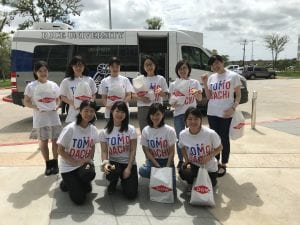 This is a five-week research internship program for 10 female undergraduates from Japan who are majoring in science & engineering (S&E). Held at Rice University in Houston, TX, the program will enable students to gain real world experience with S&E research, provide an introduction to U.S. higher education and provide opportunities for cultural engagement and collaboration with U.S. students. The program will serve as a catalyst for female Japanese students interested in S&E study and research and engagement with the U.S. through international research collaborations.
This is a five-week research internship program for 10 female undergraduates from Japan who are majoring in science & engineering (S&E). Held at Rice University in Houston, TX, the program will enable students to gain real world experience with S&E research, provide an introduction to U.S. higher education and provide opportunities for cultural engagement and collaboration with U.S. students. The program will serve as a catalyst for female Japanese students interested in S&E study and research and engagement with the U.S. through international research collaborations.
To date, 40 Japanese undergraduate students from 20 universities in Japan have participated in this program. Of these participants, 26 or 86.6% have been women.
| Institution Name | Participants | Institution Name | Participants |
| Doshisha University | 2 | Sophia University | 1 |
| Keio University | 1 | Tohoku University | 1 |
| Kyoto University | 1 | Tokyo Institute of Technology | 3 |
| Kyushu University | 3 | Tokyo University of Science | 2 |
| Meiji University | 1 | Tokyo Women’s Medical University | 1 |
| Nagoya University | 2 | Tottori University | 1 |
| Osaka Prefecture University | 1 | Toyota Technological Institute | 1 |
| Osaka University | 5 | University of Tokyo, The | 7 |
| Ochonomizu University | 1 | University of Tsukuba | 1 |
| Shinshu University | 1 | Waseda University | 4 |
Alumni – Graduate Application Fee Waivers & Requesting a Rice University Transcript
Alumni of the TOMODACHI STEM short-term research internship programs may be eligible for an application fee waiver if applying to a Master’s or Doctoral program at Rice University. If you are an alumnus and plan to apply to graduate school at Rice University please contact Prof. Kono or Sarah Phillips directly.
Alumni who are applying to other programs abroad and/or graduate school abroad may request a copy of their Rice University transcript showing their enrollment and grade in the ELEC 007 course they completed as a participant in the program through the Office of the Register. Follow the instructions for requesting a transcript from the National Student Clearinghouse (NSC). Current Rice University students/alumni can request their transcript through Esther.
Funding for this program is provided by the U.S.-Japan Council through their TOMODACHI Initiative, a public-private partnership, born out of support for Japan’s recovery from the Great East Japan Earthquake, that invests in the next generation of Japanese and American leaders through educational and cultural exchanges as well as leadership programs.
_____________________________________________________________________________
2016 – 2018 Nakatani RIES: Research & International Experiences for Students Fellowship
The 2016 – 2018 Nakatani RIES Fellowship was a program of the Nakatani Foundation in Japan that was implemented by Rice University. It connected undergraduates with the best of science & engineering research in the U.S. or Japan. The program served as a catalyst for U.S. & Japanese students interested in future graduate study and research and sought to contribute to the development of a generation of globally-engaged scientists & engineers who have the technical and culture skills to contribute to vibrant international research collaborations in the future.
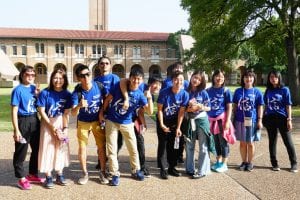 Japanese Fellows could apply to spend up to six weeks in the U.S. from August – September. While abroad, Japanese fellows participated in an two-day Orientation to Research & Higher Education in the U.S. at Rice University, a five-week, hands-on research internship in a science or engineering host laboratory at Rice University with the capstone being the presentation of a research poster at a university symposium, and a one-week final week program on the East Coast.
Japanese Fellows could apply to spend up to six weeks in the U.S. from August – September. While abroad, Japanese fellows participated in an two-day Orientation to Research & Higher Education in the U.S. at Rice University, a five-week, hands-on research internship in a science or engineering host laboratory at Rice University with the capstone being the presentation of a research poster at a university symposium, and a one-week final week program on the East Coast.
From 2016 – 2018, 31 Japanese undergraduates participated in this program from 13 different universities in Japan. Among these participants, 17 or 44.4% were women.
| Institution Name | Participants | Institution Name | Participants |
| Doshisha University | 1 | Tohoku University | 6 |
| Hiroshima University | 1 | Tokyo Institute of Technology | 2 |
| Kyoto University | 1 | Toyota Technological Institute | 1 |
| Kyushu University | 1 | University of Tokyo, The | 7 |
| Nagoya University | 3 | University of Tsukuba | 1 |
| Osaka University | 2 | Waseda University | 2 |
| Ritsumeikan University | 2 |
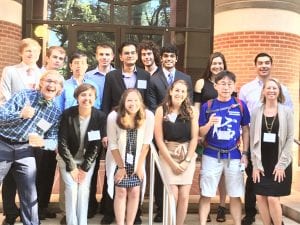 U.S. Fellows could to spend up to 13 weeks in Japan in summer from mid-May to mid-August. The program included a 2-day Pre-Departure Orientation at Rice University, a three-week Japanese language, culture, and society orientation and introduction to research in Tokyo, a nine-week, hands-on science or engineering research internships at a Japanese university, and a one-day closing workshop in Tokyo, and a three-day Re-Entry Program at Rice University with the capstone being the presentation of a research poster at the Smalley-Curl Institute Summer Research Colloquium.
U.S. Fellows could to spend up to 13 weeks in Japan in summer from mid-May to mid-August. The program included a 2-day Pre-Departure Orientation at Rice University, a three-week Japanese language, culture, and society orientation and introduction to research in Tokyo, a nine-week, hands-on science or engineering research internships at a Japanese university, and a one-day closing workshop in Tokyo, and a three-day Re-Entry Program at Rice University with the capstone being the presentation of a research poster at the Smalley-Curl Institute Summer Research Colloquium.
From 2016 – 2018, 38 U.S. undergraduates participated in this program from 24 different universities and colleges throughout the U.S. Among these participants, 14 or 45.1% were women.
| Institution Name | Participants | Institution Name | Participants |
| Bethel University | 2 | St. Joseph’s College (NY) | 1 |
| Brown University | 1 | Stevens Institute of Technology | 1 |
| Carnegie Mellon University | 2 | University of Florida | 1 |
| Case Western Reserve University | 2 | University of Hawai‘i at Mānoa | 2 |
| College of William and Mary | 1 | University of Massachusetts, Amherst | 1 |
| Columbia University | 1 | University of Pittsburgh | 1 |
| Cornell University | 2 | University of Rochester | 1 |
| Georgia Institute of Technology | 1 | University of Texas, Austin | 3 |
| Pennsylvania State University | 1 | University of Wisconsin, Madison | 1 |
| Purdue University | 1 | Washington University in St. Louis | 1 |
| Rice University | 8 | Willamette University | 1 |
| Southern Illinois Univ., Carbondale | 1 | Yale University | 1 |
Alumni – Graduate Application Fee Waivers & Requesting a Rice University Transcript
Alumni of the Nakatani RIES Fellowship short-term research internship programs may be eligible for an application fee waiver if applying to a Master’s or Doctoral program at Rice University. If you are an alumnus and plan to apply to graduate school at Rice University please contact Prof. Kono or Sarah Phillips directly.
Alumni who are applying to other programs abroad and/or graduate school abroad may request a copy of their Rice University transcript showing their enrollment and grade in the ELEC 007 course they completed as a participant in the program through the Office of the Register. Follow the instructions for requesting a transcript from the National Student Clearinghouse (NSC). Current Rice University students/alumni can request their transcript through Esther.
Rice University served as the implementing institution for the Nakatani Foundation’s 2016 – 2018 Nakatani RIES Fellowship. For information on future education programs of the Nakatani Foundation please consult their website directly (English/Japanese).
_____________________________________________________________________________
2006 – 2015 TeraNano PIRE NanoJapan IREU in Japan
Headquartered at Rice University, this NSF-PIRE renewal award (OISE-0968405) was a continuation of our successful PIRE I award. In total, these two PIRE grants supported our research and educational activities from 2005 – 2015.
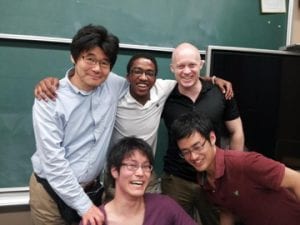 This PIRE project brought together researchers from Rice University, the University at Buffalo (SUNY), the University of Florida, Texas A&M University, the University of Tulsa, and many research collaborators from universities throughout Japan to investigate terahertz (THz) science and technology of nanosystems. The U.S. and Japan are world leaders in both THz research and nanotechnology, with complementary expertise that creates real value to the U.S. from collaboration. Japan is a world leader in the fabrication of nanostructures, and the U.S. is a world leader in characterization, that is, in studying the properties of materials. Our PIRE team’s research breakthroughs will lead to real-world applications, including airport and customs screening technology, next-generation wireless communication networks with ultrahigh data rates, and rapid and safe cancer detection methods.
This PIRE project brought together researchers from Rice University, the University at Buffalo (SUNY), the University of Florida, Texas A&M University, the University of Tulsa, and many research collaborators from universities throughout Japan to investigate terahertz (THz) science and technology of nanosystems. The U.S. and Japan are world leaders in both THz research and nanotechnology, with complementary expertise that creates real value to the U.S. from collaboration. Japan is a world leader in the fabrication of nanostructures, and the U.S. is a world leader in characterization, that is, in studying the properties of materials. Our PIRE team’s research breakthroughs will lead to real-world applications, including airport and customs screening technology, next-generation wireless communication networks with ultrahigh data rates, and rapid and safe cancer detection methods.
Equally importantly, this PIRE award has accomplished impressive results in fostering interest in nanotechnology, an integral part of the 21st century economy, among early stage American undergraduate students through its award-winning NanoJapan: International Research Experience for Undergraduates Program. The NanoJapan Program was a 12-week, summer research internship focusing on Terahertz (THz) Dynamics in Nanostructures that is open to freshman and sophomore engineering and physics students from universities nationwide. Our program design, combining the best aspects of a traditional study abroad experience with intensive nanotechnology research internships, has been nationally recognized as an innovative and effective model for international STEM programs.
- In 2012, NanoJapan was profiled in a National Academy of Engineering Report on “Infusing Real World Experience into Engineering Education” (see pg. 33)
- In 2008 NanoJapan received the IIE Heiskell Award as a ‘Best Practice in Study Abroad’ for expanding opportunities for STEM students.
- View more awards and publications about the NanoJapan: IREU program model.
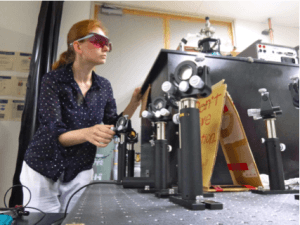 From 2006 to 2015, 144 freshman and sophomore students participated in the NanoJapan: IREU Program, representing 49 different U.S. institutions, including two historically black colleges and universities, five community colleges, liberal arts colleges, and a wide range of public and private research institutions. The program was particularly successful in recruiting underrepresented STEM students. Female students represented 35.4% of NanoJapan participants overall and 16.8% of participants reported being members of diverse ethnic groups in STEM fields (not Asian or Caucasian).
From 2006 to 2015, 144 freshman and sophomore students participated in the NanoJapan: IREU Program, representing 49 different U.S. institutions, including two historically black colleges and universities, five community colleges, liberal arts colleges, and a wide range of public and private research institutions. The program was particularly successful in recruiting underrepresented STEM students. Female students represented 35.4% of NanoJapan participants overall and 16.8% of participants reported being members of diverse ethnic groups in STEM fields (not Asian or Caucasian).
Alumni – Graduate Application Fee Waivers & Requesting a Rice University Transcript
Alumni of the NanoJapan: IREU short-term research internship programs may be eligible for an application fee waiver if applying to a Master’s or Doctoral program at Rice University. If you are an alumnus and plan to apply to graduate school at Rice University please contact Prof. Kono or Sarah Phillips directly.
Alumni who are applying to other programs abroad and/or graduate school abroad may request a copy of their Rice University transcript showing their enrollment and grade in the ELEC 007 course they completed as a participant in the program through the Office of the Register. Follow the instructions for requesting a transcript from the National Student Clearinghouse (NSC). Current Rice University students/alumni can request their transcript through Esther.
_____________________________________________________________________________
2011 Reverse NanoJapan Program in Response to 3/11 Great East Japan Earthquake and Tsunami
Our existing NanoREIS program structure (see above) proved invaluable when the March 3, 2011 Earthquake forced us to reverse the NanoJapan: IREU program design and bring 14 U.S. and 25 Japanese students to Rice for the ‘2011 Reverse NanoJapan’. Rice’s research facilities were made available to the Japanese students whose research had been suspended due to energy shortages and other after effects of the disaster in Japan and, at the same time, the U.S. students were able to still be involved in international research collaboration with a Japanese student; one of the hallmarks of the NanoJapan Program. The NSF offered supplemental funding through a special allocation for projects impacted by the earthquake an tsunami which enabled us to off-set some travel and program costs for the Japanese student participants. The Office of the President at Rice University also provided full funding for on-campus housing in the graduate apartments, enabling the U.S. and Japanese students to live together for a more robust inter-cultural experience. In-kind support in the form of guest speakers, special workshops, and other cultural events was also provided by a range of Houston-area organizations including the Japanese Consulate in Houston, the Japan Association of Greater Houston, and Kaminari Taiko.
“Rice has been very supportive,” Prof. Junichiro Kono, PI of the NSF-PIRE grant that funds NanoJapan, said. “The President’s Office kindly provided all the housing support and meals for all the students, both U.S. and Japanese. The National Science Foundation has allowed us to use our grant to support the Japanese students, which is also unusual. We’re also getting some personal and industry donations to support this program. Everything is working great. The NanoJapan Program will return to Japan in 2012, but since this reverse program is going so well, if we can get enough support, we want to continue in some way to have Japanese students here at Rice.”
- View Video of 2011 Reverse NanoJapan
- Read Overview of 2011 Reverse NanoJapan – In English
- Read Overview of 2011 Reverse NanoJapan – In Japanese
- Read Photonics Spectra article on Reverse NanoJapan – In English
- Read Southern Journal article on Reverse NanoJapan – In Japanese, Pg. 3
- Read Gulfstream: Japanese Business Association of Houston Newsletter article on Reverse NanoJapan – In Japanese
_____________________________________________________________________________
INNOVATE: Technology Globalization and Innovation Conference in Asia (2006 – 2010)
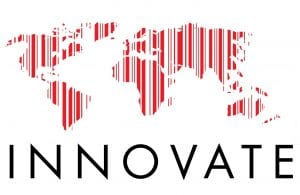 With partial funding from our NSF-PIRE grant, Rice University served as the headquarters for the INNOVATE: Technology, Globalization, and Innovation Conference in Asia from 2006 – 2010. This program brought 310 undergraduate and graduate students to two different countries in Asia for a 10-day program abroad for site visits to leading engineering and technology companies. INNOVATE gave students the opportunity to learn first-hand how technology has driven globalization and business decision-making in the Asia-Pacific.
With partial funding from our NSF-PIRE grant, Rice University served as the headquarters for the INNOVATE: Technology, Globalization, and Innovation Conference in Asia from 2006 – 2010. This program brought 310 undergraduate and graduate students to two different countries in Asia for a 10-day program abroad for site visits to leading engineering and technology companies. INNOVATE gave students the opportunity to learn first-hand how technology has driven globalization and business decision-making in the Asia-Pacific.
Students were also concurrently enrolled in a spring semester seminar course, ENGI 205: Topics in Global Leadership and Technology that was taught via live interactive webcast with partner instructors at the University of Tulsa and University of Pittsburgh. The first part of the course focused on preparing students for the intensive, 10-day program abroad held during spring break. The last part of the course focused on reflections of that study-tour and a better understanding of issues facing both the U.S. and the host countries in Asia. Each week focused on a relevant topic: history and politics, economics, contemporary culture and demographics, and technological and engineering trends.
- INNOVATE 2006: Shanghai, China & Osaka Japan
- 58 student delegates from IAESTE China, IAESTE U.S., Keio University (Japan), North Carolina State University, the University of Pittsburgh, Rice University, and the Tokyo Institute of Technology (Japan).
- INNOVATE 2007: Beijing, China and Bangalore, India
- 63 student delegates from Georgia Institute of Technology, IAESTE US, the Indian Institute of Technology, Bombay, the Indian Institute of Technology, Madras, Keio University, the National University of Singapore, North Carolina State University, Singapore Management University, Rice University, University of Pittsburgh, and the University of Tulsa.
- INNOVATE 2008: Vietnam & Singapore
- 69 student delegates from Georgia Institute of Technology, IAESTE US, Keio University, National University of Singapore, North Carolina State University, Rice University, the University of Pittsburgh, the University of Tulsa, and a number of other Vietnamese universities.
- INNOVATE 2009: Vietnam & Taiwan
- 56 student delegates from the American University of Beirut, Georgia Institute of Technology, Keio University, National Cheng Kung University (Taiwan), National University of Singapore, Rice University, University of Pittsburgh, University of Tulsa, Yuan Ze University (Taiwan).
- INNOVATE 2010: Vietnam & Taiwan
- 64 student delegates from Georgia Institute of Technology, Hokkaido University (Japan), Keio University, National Cheng Kung University, National Taiwan University, Pennsylvania State University, Rice University, University of Pittsburgh, University of Tulsa, and Vietnam National University
- INNOVATE 2011 – 2013: China
- In 2011, the University of Pittsburgh School of Engineering took over the management and implementation of INNOVATE. Rice university students participated in conference abroad and ELEC 205 course.



